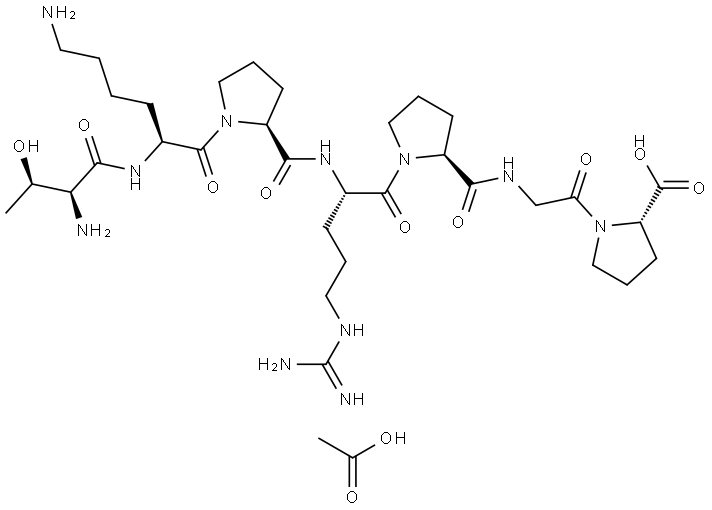Description
Selank is a synthetic derivative of the tetrapeptide tuftsin that contains a proline-glycine-proline sequence at the C-terminus and has anxiolytic and anti-inflammatory activities.
1,2,3,4 It increases the amplitude and discharge rate of inhibitory postsynaptic currents of neurons in the rat hippocampal CA1 region when used at a concentration of 1 μM.
1 It decreases the level of affective responses and the number of erroneous escape attempts in rats in an acute stress situation, increases orientational-investigative responses of rats in an unfamiliar situation, and reduces the time mice spend immobile in the forced swim test.
2 It increases locomotor activity of high-anxiety Balb/c, but not C57Bl/6, mice in the open field test. Selank (0.01 mg/kg) decreases verticalization induced by apomorphine in mice.
3 It also decreases expression of the inflammation-related genes
Il2rg and
Xcr1 in mouse spleen after 90 minutes when administered at a dose of 100 μg/kg.
4
References
1. Povarov, I.S., Kondratenko, R.V., Derevyagin, V.I., et al.
Effect of Selank on spontaneous synaptic activity of rat hippocampal CA1 neurons Bull. Exp. Biol. Med. 162(5),640-642(2017).
2. Kozlovskaya, M.M., Kozlovskii, I.I., Val'dman, E.A., et al.
Selank and short peptides of the tuftsin family in the regulation of adaptive behavior in stress Neurosci. Behav. Physiol. 33(9),853-860(2003).
3. Meshavkin, K.V., Kost, N.V., Sokolov, O.Y., et al.
Naloxone-blocked depriming effect of anxiolytic selank on apomorphine-induced behavioral manifestations of hyperfunction of dopamine system Bull. Exp. Biol. Med. 142(5),598-600(2006).
4. Kolomin, T., Morozova, M., Volkova, A., et al.
The temporary dynamics of inflammation-related genes expression under tuftsin analog Selank action Mol. Immunol. 58(1),50-55(2014).

